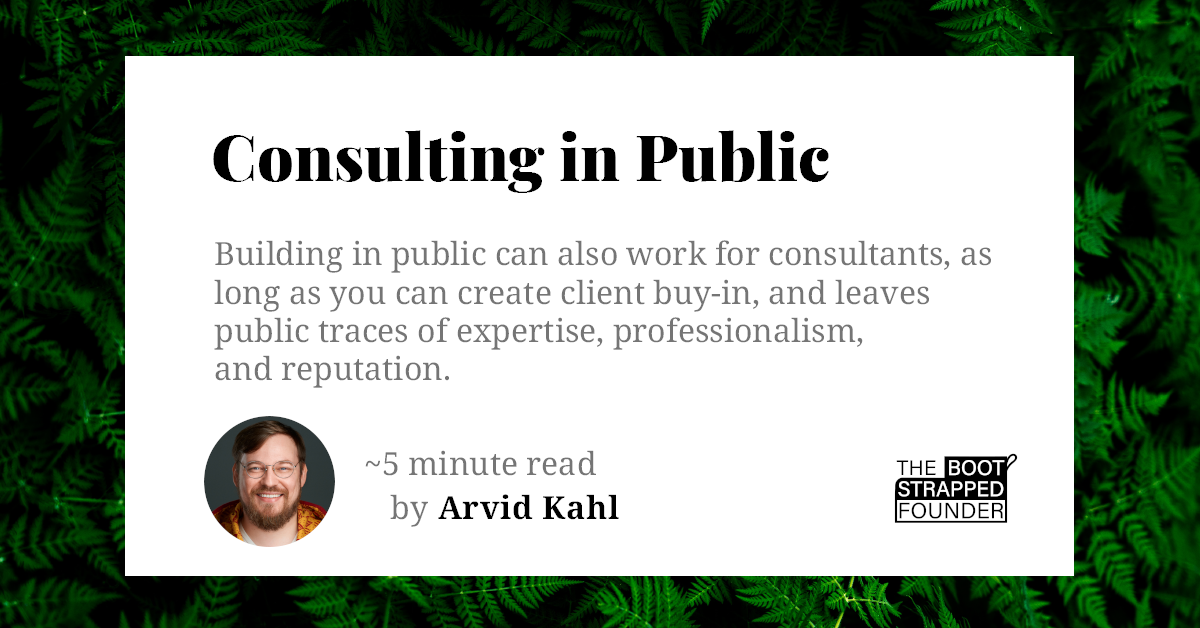Building in public is becoming a popular way to build a business. But how about consulting in public? Can entrepreneurs go beyond talking about their business? Can they conduct their business out in the open?
Rand Fishkin recently asked Patrick Campbell —who just sold ProfitWell for $200 million— to help him with their pricing. Immediately, people wanted to listen in on that high-profile conversation and asked the two founders to work it out in public.
Similarly, I talked to Louis Nicholls of SparkLook not long ago to set up the rewards for my newsletter referral system. We decided to publish the conversation as part of Louis’ podcast Send and Grow.
It was an onboarding conversation turned podcast episode. I shared my business needs, Louis shared his comments, insights, and suggestions, and we ended up with a solid set of newsletter referral rewards. The process of how we came to select them is now in the public record, forever. Louis got to show how much he knows about newsletter growth, and I had a chance to talk about why I write, what I write, and who I write for.
Experience this article as a podcast, a YouTube show, or as a newsletter:
Consultants have been doing public expertise demonstrations for a long time: free webinars are a common top-of-the-funnel lead generation tactic. But those are usually using non-specific blinded examples with the intent to obfuscate the client’s identity.
What I want to talk about here today is the opposite: a public consulting session with clear buy-in from —and collaboration with— a client. Consulting in public exposes the consultant’s expertise while giving the client reach and community awareness, painting them as a public educator in their industry.
Consulting in public looks like an incredibly attractive way to share expertise and build a reputation as an expert. But is it safe? Does it actually convert? Do the benefits outweigh the risks?
I believe they do, but only under certain conditions. It’s not a free-for-all.
Risks and Mitigation
For people who struggle to make ends meet, doing work for free in the hope of getting exposure is incredibly dangerous. Consulting in public tends to be an unpaid activity because the act of publishing a conversation usually benefits everyone involved equally. Paid consulting is about exclusive access, and when that exclusivity vanishes, so does compensation.
What both parties pay with is their reputation. The consultant risks inviting criticism of their skill —as it’s very easy to dissect a public conversation— while the client has affiliation risk, as customers get to see what businesses the client partners with and how they think about their customers.
From what I’ve seen, this leads to a “reputationally balanced” lineup. High-profile founders talk to high-profile consultants. Indie hackers talk to indie service owners. I have yet to find a highly skewed consulting session made public. It usually happens between people on the same level and almost exclusively between entrepreneurs with a prior relationship. Without trust, there is no consulting in public.
This leads us to the second part of the risk calculation: protecting company secrets.
Every potential client will have to ask themselves, “If I talk to someone about my business, can I trust them to navigate the conversation around sensitive topics while still fully addressing my needs?”
Consulting generally requires high trust levels. Internal numbers and strategies are commonly shared during these sessions, and if you know that what you say might be published, you might censor yourself, both as the client and the consultant.
Some actors in the podcasting space have a reputation for coercing their guests into publicly talking about company internals that they’re legally prohibited from discussing. They make people wary of talking to publicly exposed figures in the first place, and it certainly makes it less appealing to become a public consulting client.
While there is always the option of editing out the details or dropping the recording entirely, the risks are present when something has been recorded that shouldn’t have been. That’s why it’s essential to trust the consultant: if they are more interested in elevating their reputation than protecting their client’s secrets, you have a problem.
Mitigating these risks boils down to having rules about what both parties will and won’t be able to discuss. These points need to be exchanged in advance — and it needs to be very clear. The success of such a conversation is quickly hindered by the legal requirements of d business processes, which makes consulting in public almost impossible for larger enterprise customers with all the Non-Disclosure Agreements and legal barriers around. Unless you do it like Patrick Campbell, ask the CEO directly. Then you might have a shot.
But you don’t need to do hour-long sessions to consult in public. Josh Spector suggests doing some micro coaching, offering free advice about specific challenges your followers may have, and then engaging heavily in the replies. That way, it’s still public consulting without the high-risk components.
Upsides of Consulting in Public
Combining the reputational risk with the risks of exposing business secrets leads me to believe that extensive and podcast-worthy “consulting in public” is most effective between founders with a solid pre-existing relationship and when it’s being used for “building in public” purposes.
And that’s a very narrow niche.
But just in case you find yourself in that very situation, here are a few upsides that might convince you to give it a go:
- Consulting in public signals professionalism. If a consultant conducts a consulting session and gets their client to appreciate their work, the listeners and viewers will have witnessed a professional service being rendered. Not only will this net the consultant more work, but it will continue to build both parties’ reputations as serious entrepreneurs.
- Consulting in public signals expertise. Everyone wants to learn from experts — and people consider those they learn from to be experts. By putting your work out there, you’re creating evidence of your expertise. This goes for the consultant and the client, both subject matter experts at their crafts.
- Consulting in public allows for brand-building. While both parties benefit from reputation and expertise signals, they also actively teach the people listening. Consulting done right is extremely powerful. Getting a glimpse into the inner workings of a business is equally attractive. Being liberal with this information is a strong indicator of both parties’ willingness to contribute to the knowledge production inside their community.
Consulting in public definitely is a great marketing move: the folks at Ecom Crew have a podcast segment called Under the Hood where they offer free consulting sessions that get turned into podcast episodes.
There are a few low-risk jump-off points if you want to try out consulting in public.
- You can offer free discovery sessions that get recorded. Recording something doesn’t mean releasing it; you can discard the takes that didn’t work out. But when there is chemistry between you and your client, the resulting recording can create a strong public pull towards your consulting business.
- Whenever you “get on a quick call” with someone, ask to record it. If they agree, this can be a great “micro-consulting” opportunity. You won’t risk divulging too much information as the problem is well-scoped, and it’s not too formal of a call. This is best done with clients you have built a lot of trust with that clearly opt-in and have something to gain from talking about their issue in public.
And finally, there is a personal-growth angle to this idea as well: it takes courage to consult in public. It’s like asking someone out on a date, but for business, and in front of potentially thousands of fellow professionals. That’s a lot of pressure.
But it’s worth it. You create a permanent record of your ability. It will turn into public evidence of your skill, your ambition, your tenacity, and the impact you can have on someone else’s business.
As long as it’s beneficial to the consultant and the client, consulting in public is a great idea.
The post Consulting in Public appeared first on The Bootstrapped Founder.

